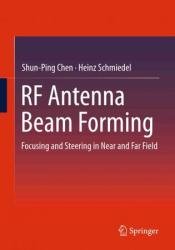RF Antenna Beam Forming Focusing and Steering in Near and Far Field
- Добавил: literator
- Дата: 26-03-2023, 19:31
- Комментариев: 0
 Название: RF Antenna Beam Forming Focusing and Steering in Near and Far Field
Название: RF Antenna Beam Forming Focusing and Steering in Near and Far FieldАвтор: Shun-Ping Chen, Heinz Schmiedel
Издательство: Springer
Год: 2023
Страниц: 141
Язык: английский
Формат: pdf (true), epub
Размер: 45.1 MB
This book is designed for both the scientific audience, research and development engineers and the university students. The fundamentals of radio frequency antenna beam forming is explained in this book. The principles of beam focusing and beam steering in near field and far field are visualized with 2D and 3D simulations and compared with measurement results. Besides linear and planar antenna arrays, also conformal arrays, i.e. concave and convex antenna arrays, suitable for certain applications, are investigated and presented. Also related applications of radio frequency beam forming like open loop and closed loop large scale antenna arrays or massive MIMO, which is one of the break-through technologies for 5G and future 6G and involves an extremely large number of antenna elements for the multi-user beam forming, as well as thinned antenna arrays with electrically large distances between the antenna elements are discussed.
This book has been written for students in Electrical and Electronics Engineering and Information Technology. It is also written for radio frequency (RF) engineers to give a technology oriented overview of phased array antennas, beam steering and beam forming. This may allow engineers and also project managers, involved in RF design, to develop visions and opportunities with their own applications.
Phased array antennas have been developed since the 1960s and have seen many applications. Some of these use fixed arrays to increase the aperture of an antenna system to obtain a desired gain and performance. Others use controlled phases and amplitudes to allow beam steering and beam forming. The antenna system performance depends on the antenna elements and on the proper phase and amplitude control. With phase control for the individual antenna elements an antenna beam can be steered over a wide angle range. By additionally controlling the amplitudes for all antenna elements individually the beam can be formed to given specification, e.g. side lobes suppression. Well known, successful applications of steerable antenna arrays are e.g. part of the PATRIOT air defense system. Also IRIDIUM relies on phased array panels with steerable beams for worldwide telephone and data communication. Beam steering is also essential for existing and future 5G mobile communication systems. A whole chapter in this book has been dedicated to these important MIMO-antenna systems. Most readers will be familiar with Maxwell’s equations and electromagnetic waves. Nevertheless a first chapter is a brush up for Maxwell’s equations and electromagnetic wave theory, as far as needed as foundation for the antennas described later in the book. It may help the reader to get started into the antenna topic. In the following chapter basic antenna elements are described. All these may be used in phased array antenna systems. Well known are dipole arrays for TV reception, helical antenna arrays on the GPS satellites, patch antennas on the IRIDIUM satellites, and many more.
Next is a comprehensive chapter on linear antenna arrays. It explains a complete set of arrangements for defined steering and beam forming. Comprehensive simulation results, along with measurement results, are discussed in detail. Examples are shown for defined beam steering angles. With an appropriate distribution of amplitude weights the shape of the beam can be designed. Equal weight, Chebyshev and binomial, that is similar to a Gaussian weight, are investigated, simulated and measured for different beam steering angles. The performance of these linear antenna arrays is investigated for far field and near field also.
The results for these linear arrays are put into a two-dimensional context in the next chapter. Planar arrays, where the antenna elements are placed in a two-dimensional plane, are investigated. Again beam steering is simulated and beamforming is applied to obtain desired beam shapes. So far all descriptions were related to antenna arrays oriented in one plane only.
Contents:
Скачать RF Antenna Beam Forming Focusing and Steering in Near and Far Field
[related-news] [/related-news]
Внимание
Уважаемый посетитель, Вы зашли на сайт как незарегистрированный пользователь.
Мы рекомендуем Вам зарегистрироваться либо войти на сайт под своим именем.
Уважаемый посетитель, Вы зашли на сайт как незарегистрированный пользователь.
Мы рекомендуем Вам зарегистрироваться либо войти на сайт под своим именем.

